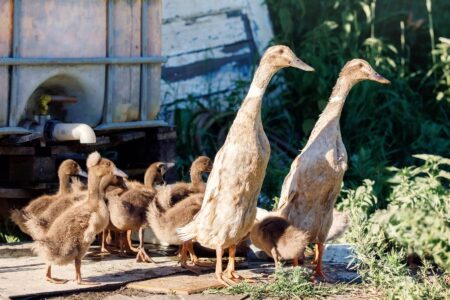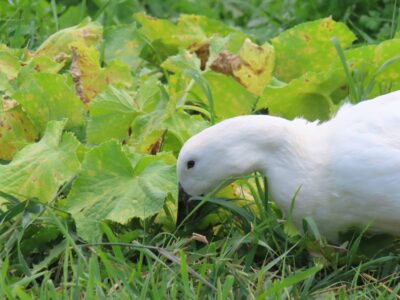Do ducks eat bugs? Learn how to put your web-footed friends to work in your garden while keeping your plants safe.
Gardeners have been raising chickens in gardens for centuries – but ducks in gardens? Believe it or not, keeping ducks in a small garden is growing in popularity, and for good reason too. With their adorable faces and cheery quacks, ducks work alongside gardeners to help clear the garden of harmful bugs and larvae. From Japanese beetles to slugs, ducks are excellent at removing pests, and you might be surprised by how quickly they can eliminate bug infestations.
Ducks are increasingly being used in gardens in the UK, where the damp conditions create the perfect breeding grounds for destructive snails and slugs. Some countries use ducks to clear out infestations of snails, which can cause liver flukes in cattle and sheep. A task force of 24 Indian Runner ducks covering an area of almost 50 acres is hard to beat.
Before you purchase your first group of these tail-waggling waterfowl, first determine whether ducks would complement your garden and how you’d like to put them to work.
Are Ducks a Good Fit for Your Backyard?
Ducks need water, food, and protection from the elements. However, they also need extra amenities to survive, such as predator protection.
- Water. Ducks need fresh, clean drinking water every day. Since ducks tend to dirty their water quickly, dump and refill buckets with clean water twice daily.
- Nutrition. Feed your ducks a well-balanced chicken-layer ration. To help your ducks live long and healthy lives, supplement their diet with probiotics, prebiotics, herbs, and brewer’s yeast. Talk with your vet to determine the specific nutrition needed for your flock.
- Swimming water. Ducks love water, so you can provide access to clean swimming water several times a week. The good news is that ducks don’t require a pond and will happily splash in a kiddie pool. Many duck owners prefer kiddie pools to ponds, because they don’t have to worry about snapping turtles or about their ducks contracting diseases from wild waterfowl that have access to the pond or the pond’s feeding source. (To prevent the garden from becoming muddy, place pools, buckets, or other water sources at the garden’s edge.)
- Predator protection. Most domesticated ducks can’t fly away to protect themselves from hungry predators. So, take all necessary precautions to protect your flock. Provide covered runs and predator skirts to deter digging predators, and leave no gap bigger than 1/2 inch in either your coop or run. Make sure the enclosure has a cement floor and 1/2-inch hardware cloth over any windows. (One of the best ways to prevent predator attacks is to supervise foraging ducks.)
- Community. Ducks live in flocks and thrive on companionship from other ducks.
- Where do ducks sleep? Unlike chickens, ducks don’t roost on a perch, and they don’t spend nights on a pond like their wild cousins, so where do domestic ducks sleep? They prefer to slumber in a nest of straw on the floor in an entirely predator-proofed chicken coop or barn.
Before purchasing ducks, check with your local laws to confirm ducks are allowed in your neighborhood. You may also want to let your neighbors know about your birds and answer any questions they may have.
Will Ducks Eat Your Garden?
Keeping ducks in the garden doesn’t mean all of your plants will be eaten and your garden destroyed. Ducks enjoy snacking on berries, lettuce, and other greens, but in my experience, allowing our ducks to work in the vegetable patch for short periods while supervised helps the tender vegetation avoid destruction from bugs, and the ducks tend to leave the plants alone when they have plenty of bugs to snack on instead. When they’ve finished their time in the garden, just send them back into their predator-proofed pens or run. Or, if your ducks will free-range, install a fence around the garden’s perimeter so they can’t access those plants when you don’t want them to.
When raising ducks in gardens, avoid planting rhubarb and members of the nightshade family, including tomatoes, potatoes, and eggplants. All parts of these plants – fruits, leaves, stems, and roots – are toxic to ducks. If you want to grow these plants, set up a fenced barrier so the ducks can’t access them.
Choose Your Duck Breed
Choosing the right breed is crucial for having the perfect garden helper. Consider the following breeds for their pest-control prowess. (While Muscovies excel at pest control, I left them off this list because of federal laws prohibiting the release of Muscovies.)
- Ancona. If you have a banana slug problem, Ancona ducks are the breed for you. Anconas love to forage for insects and slugs. They have a calm disposition and aren’t easily frightened. While this breed stays close to home, it prefers free-ranging over confinement. For this reason, it’s not the best breed for urban areas.
- Indian Runner. When selecting a breed for slug or other pest control, it’s hard to beat the Indian Runner, which will run through the garden, removing all traces of slugs. This breed is considered nervous but can be tamed as pets in small flocks.
- Khaki Campbell. This active breed is excellent at pest control and is especially good at eliminating slugs. The Khaki Campbell is a nervous breed, so these ducks may not make the friendliest of family pets. Hens are egg-laying champions, averaging 300 eggs per duck annually.
- Pekin. Pekins are excellent garden foragers, consuming pests while staying close to home. These ducks are a good breed for the novice and perfect for urban and suburban settings. Hens and drakes are friendly and will quickly become part of the family. The white feathering on a Pekin makes them easy for predators to spot, so never allow Pekins to free-range unless directly supervised by an adult.
![]()
- Welsh Harlequin. This breed has a unique bug-catching style all its own. While many breeds forage with their bills through the garden, these energetic ducks prefer flying insects. Nothing is more entertaining than watching a Welsh Harlequin race about the garden after a bug before gobbling it up midair. This breed is active and fun and loves interacting with humans. However, males are vigorous breeders, so keep a low ratio of drakes to ducks per flock.
A Duck’s Favorite Dinner
If you’d rather not have your ducks forage in your garden, or if you just want to assist your ducks in maximizing the amount of garden pests they gobble up, you can collect bugs to feed them. Depending on your comfort level, there are several ways to collect and manage insects and other bugs in your garden.
- Pick by hand. Hand-picking bugs is one of the most effective ways to remove Japanese beetles from bushes and taller plants that are out of reach of a duck. Wearing a pair of garden gloves is optional for this job. Simply pick the Japanese beetles off the plant and place them in a quart-sized, freezer-safe container. Feed the beetles to the ducks live or frozen. Our ducks prefer them frozen – and frozen also makes a great summer treat.
- Use a net. If grasshoppers are a problem, catch them with a butterfly net. Feed the grasshoppers to your ducks live or frozen.
- Trap them. Bug traps are easy to set up and are an affordable way to remove bugs from the garden. You can buy a bug trap from the store, or, if you have a slug problem, you can build your own. Slug traps are a great way to rid your garden of slugs while keeping tender plants safe from webbed feet. Use cheap materials, such as cardboard, leftover patio blocks, or non-pressure-treated wood (I use part of an old cementing frame), to remove slugs from your garden without using harmful pesticides. Lay the cardboard, patio blocks, or wood around the perimeter of your garden, paying close attention to areas with high slug infestations (think lettuce, strawberries, etc.). Every morning, flip over the traps and check the undersides for slugs and other bugs. Scrape the slugs into your ducks’ food bowl with a trowel, and serve them up.

With the proper attention and care, ducks make amazing garden helpers and will happily work alongside you, removing pests from your garden and providing plenty of fun along the way.
Erin Snyder and her family have raised chickens and ducks for nearly two decades. She’s passionate about all things poultry, including poultry nutrition, predator protection, and egg-laying disorders. Follow her chicken adventures on Instagram @TheHenHouseHygge.





